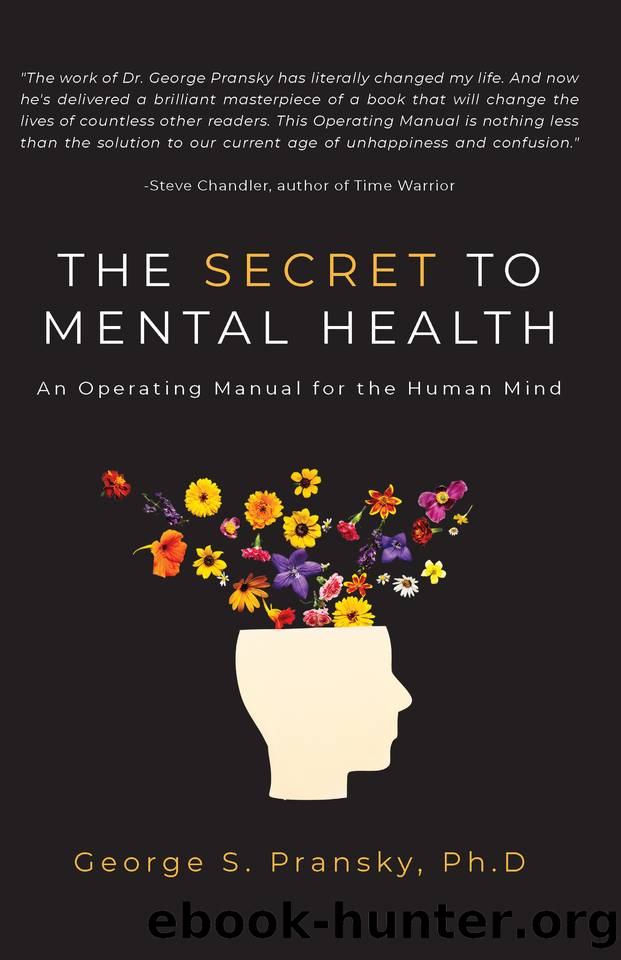The Secret to Mental Health: An Operating Manual for the Human Mind by Pransky George

Author:Pransky, George
Language: eng
Format: epub
Publisher: Pransky & Associates
Published: 2024-01-12T00:00:00+00:00
How do you get Clients to Realize these Principles?
Principle-based psychology is designed to optimize the likelihood of client insight and realization. There are two variables that consistently correlate with clientsâ ability to grasp these Principles: the grounding of the practitioner and the receptivity of the client.
By using the term, grounding of the practitioner, I refer to the extent to which the practitioner has realized these Principles for themselves. To the extent that practitioners are grounded in these Principles they will manifest high levels of well-being as a way of life. As is the case with clients, no amount of memorization or study is relevant to a practitionerâs grounding.
Once practitioners realize these Principles, they will experience improved understanding and improved well-being. To say it another way, their level of consciousness will rise.
They are then in a position to share this understanding with clients. The deeper the practitionerâs level of understanding the more clarity and certainty they bring to the coaching sessions.
Clients will see that the Three Principles are not just a theory but rather a real life understanding that is alive and well in the practitioners. Clients will see that the practitioners have themselves gained well-being from these Principles.
Up to this point in time in the old paradigm, practitioners had been evaluated on their knowledge of mental illness rather than their knowledge of mental health. Neither the public nor the profession see that the practitionersâ mental health is a factor in their effectiveness. The public assumes that if practitioners have the proper training and educational degree then they are qualified to improve their mental health.
In contrast, in principle-based psychology, the mental health level of the practitioner is seen as the driving force, the horsepower that the practitioner brings to the therapeutic process. The success rate of practitioners in principle-based psychology is tied directly to the practitionerâs own mental health level. Principle-based coaching adheres to the ancient medical profession adage, âphysician heal thyself.â An overwhelming percentage of principle-based practitioner training is focused on the practitionerâs internalized understanding of the Three Principles. As you would expect, principle-based practitioners are evaluated primarily on their personal grounding.
The first phase of the coaching process is setting the stage. Practitioners improve the receptivity of the client by drawing clients into a secure, relaxed state of mind. Human beings do everything better when they are in a secure, relaxed state of mind. They think better, they listen better, they are less defensive, and most importantly, they learn better. Obviously, clients most often come into coaching in a troubled state of mind. They are weighed down by their problems and pathologies. The principle-based practitioner realizes that any client in a distracted state of mind will have difficulty listening, responding, and learning.
Fortunately, the well-being of the practitioner is enough to draw a client into a temporary state of well-being. Because we all have mental well-being at our core, it can be drawn out by the presence of a healthy functioning person. You will notice in everyday society that peopleâs spirits rise in the presence of a high-spirited person.
Download
This site does not store any files on its server. We only index and link to content provided by other sites. Please contact the content providers to delete copyright contents if any and email us, we'll remove relevant links or contents immediately.
Solve for Happy by Mo Gawdat(2111)
The Gravity Between Us by Kristen Zimmer(1758)
What I Need by J. Daniels(1721)
The Empath's Survival Guide by Judith Orloff(1665)
Stop Being Mean to Yourself: A Story About Finding the True Meaning of Self-Love by Melody Beattie(1656)
The Little Book of Lykke by Meik Wiking(1594)
The Emotionally Absent Mother by Jasmin Lee Cori(1540)
What a Time to be Alone by Chidera Eggerue(1429)
Jealousy by Osho(1415)
Anxious for Nothing by Max Lucado(1402)
Emotional Agility: Get Unstuck, Embrace Change and Thrive in Work and Life by Susan David(1366)
Who Says You Can't? YOU DO by Daniel Chidiac(1348)
Habits of a Happy Brain by Loretta Graziano Breuning(1283)
Think Happy to Stay Happy by Becca Anderson(1202)
Manipulation: A Guide to Mind Control Techniques, Stealth Persuasion, and Dark Psychology Secrets by Deborah Weiss(1202)
Persuasion: Learn Techniques in Manipulation, Dark Psychology, NLP, Deception, and Human Behavior by Tori Dasani(1146)
'74 & Sunny by A. J. Benza(1126)
A Liberated Mind by Steven C. Hayes PhD(1096)
When Pride Still Mattered by Maraniss David(1058)
